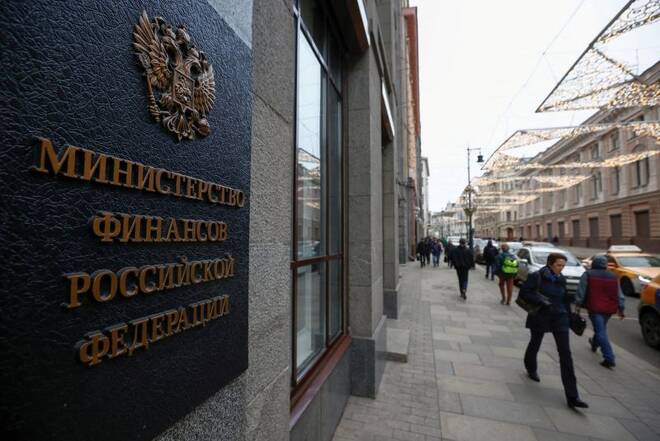Advertisement
Advertisement
Exclusive-Russian bonds would weather sanctions, but yields would rise -deputy Finance Minister
By:
By Darya Korsunskaya MOSCOW (Reuters) - Any tightening of western sanctions on an already pressured Russian domestic bond market would make borrowing more expensive for the government and trigger significant short-term volatility, a deputy finance minister said.
By Darya Korsunskaya
MOSCOW (Reuters) -Any tightening of western sanctions on an already stressed Russian domestic bond market would make borrowing more expensive for the government and cause significant short-term volatility, a deputy finance minister said.
But a strong domestic investor base means the market, where a politically driven selloff has sent benchmark rouble yields to six-year highs, would weather tougher curbs, Timur Maksimov told Reuters in an interview, adding that the ministry’s 2022 issuance plans remained on track.
Russia has massed around 100,000 troops near the Ukrainian border while denying it plans to invade If it does, western countries have threatened new financial and economic sanctions.
Under existing sanctions, U.S. investors are banned from buying new OFZ bonds, and U.S. banks from buying sovereign Eurobonds directly from Russia.
U.S. officials have floated the possibility of extending the bans to cover secondary market trading of new issues of both instruments.
On Tuesday, with 10-year yields at their highest since 2016, the finance ministry cancelled scheduled OFZ auctions for a second week running.
Auctions will resume once the market “normalises”, Maksimov said, adding that its current volatility was driven by politics rather than economics and “such a situation cannot stay forever.”
With a record-high current account surplus of $120 billion last year, enough gold and forex reserves to cover two years of imports or Russia’s entire external debt, officials say the economy is in a good shape to withstand shocks.
Maksimov said the market would ride out disruption caused if foreign investors sold all their OFZs, equivalent to just under a fifth of total holdings.
“It (new sanctions) will cause serious short-term volatility, but it will fundamentally change nothing. Because even if we wash 19% out of the portfolio, we still have 80% (held by domestic investors),” he said.
The finance ministry still plans to raise 3.3 trillion roubles ($41.5 billion) in OFZ bonds this year, re-introducing bonds with floating-rate coupons in addition to its main fixed-coupon OFZs, he said.
The ministry raised a record 5.3 trillion roubles in OFZ bonds in 2020, of which over 3 trillion was secured by ‘floaters’, which market players dominated by Russia’s biggest banks favour.
Last year, borrowing halved to 2.6 trillion roubles, with no ‘floaters’ issued.
When re-introduced, floating-rate bonds will not exceed 25% of the total OFZ stock in the medium term, Maksimov said.
($1 = 79.5984 roubles)
(Reporting by Darya Korsunskaya; Writing by Katya Golubkova; editing by John Stonestreet)
About the Author
Reuterscontributor
Reuters, the news and media division of Thomson Reuters, is the world’s largest international multimedia news provider reaching more than one billion people every day. Reuters provides trusted business, financial, national, and international news to professionals via Thomson Reuters desktops, the world's media organizations, and directly to consumers at Reuters.com and via Reuters TV. Learn more about Thomson Reuters products:
Did you find this article useful?
Latest news and analysis
Advertisement
